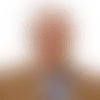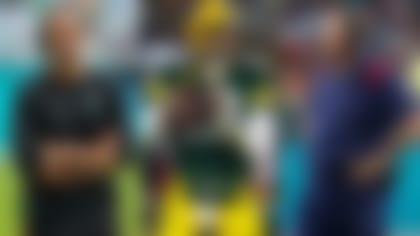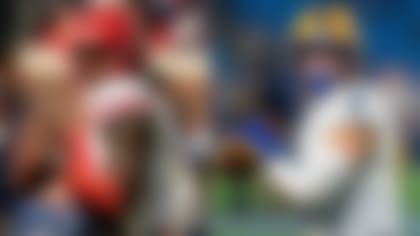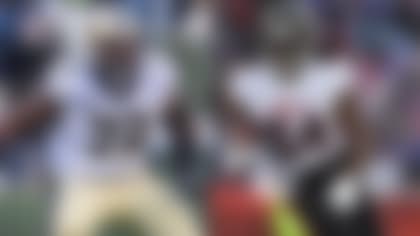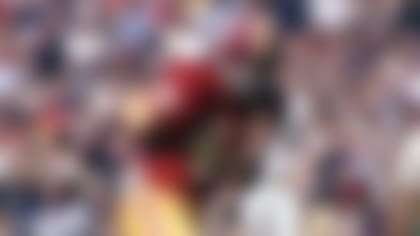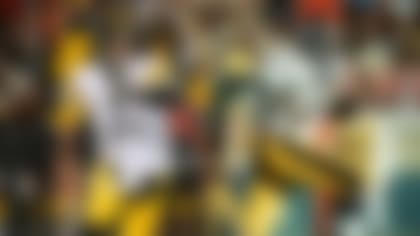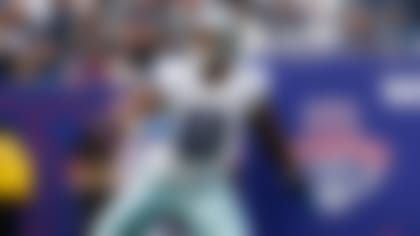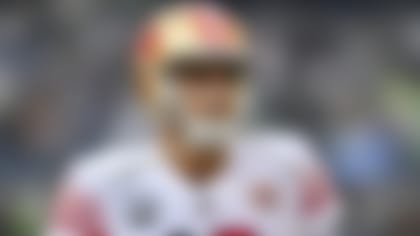Last April, 32 teams gathered in New York for the 2013 NFL Draft. After -- and, in some cases, even before -- the event was over, grades were handed out, and winners and losers were declared. Future franchise saviors were anointed, while potential busts were circled in red ink -- though each and every rookie had yet to play a single NFL snap.
Six months later, it remains difficult to say which teams came away from the draft with the best and worst classes. Half a season, after all, does not make for much of a sample size. Still, most of the rookies have had at least seven games to either make their mark or fade into the background. With that in mind, I took a stab at identifying the most and least impactful draft classes of 2013.
Of course, the results do not necessarily reflect how I think these draft classes will shake out when it's all said and done -- we likely won't know that for years. For the purposes of this piece, I was concerned only with this season, picking out the draft classes that have made serious contributions to successful teams and the classes that have all but disappeared at this early juncture. But remember: The book is far from written on the 2013 draft class. Some promising players could yet fizzle, while some of the "disappointments" -- perhaps tripped up by injuries or other factors outside their control -- could yet turn into top-notch pros.
That said, here are the most and least impactful draft classes of 2013 as I see them:
MAKING THEIR MARK
1) San Diego Chargers
The Chargers drafted three players who have made serious contributions as rookies, beginning with offensive tackle D.J. Fluker (drafted in the first round, 11th overall). From Day 1, Fluker has started for an offensive line that has been much better than it was prior to his arrival, leading to a stronger ground game and increased protection for Philip Rivers. In a resurgent season, San Diego's quarterback has been sacked just 11 times through seven games; that projects to 25 sacks on the season, which would be about half as many as Rivers endured in 2012 (49).
Thanks to a foot injury, Manti Te'o (second round, 38th overall) got off to somewhat of a slow start. However, since making his first appearance in Week 4, the linebacker has added something to San Diego's run defense, showing he can play in space. And as for first-year pros helping Rivers, Fluker isn't the only one: Keenan Allen (third round, 76th overall) has 399 receiving yards, third-most among rookies. Allen has come on especially strong lately, leading all receivers with 107 yards in the Bolts' big Week 7 win over Indianapolis.
2) Detroit Lions
Fifth overall pick Ziggy Ansah has three sacks and 19 tackles in six starts for the Lions. The notoriously green defensive end is having the kind of pass-rush impact that many more experienced guys can only dream of making. Guard Larry Warford (third round, 65th overall), meanwhile, has started every game for an offensive line that has allowed Matthew Stafford to be sacked just 10 times. Jim Schwartz told me after the draft that Warford's lack of speed -- one of the things the player was knocked for as a prospect -- would not be relevant to the team's plans; I'd say the Lions coach has been proved 110 percent right. And cornerback Darius Slay (second round, 36th overall) has helped in the secondary.
One more promising Lions draftee might slip under the radar by virtue of his position: punter Sam Martin (fifth round, 165th overall). The Appalachian State product is averaging 48.5 yards per kick -- 7 yards better than Detroit's punter averaged last season -- and already has had 10 punts downed inside the 20. Martin has been one of the factors behind the Lions' improved play in 2013.
3) New York Jets
The Jets had a very, very good draft, highlighted by defensive tackle Sheldon Richardson (first round, 13th overall). With his quickness, tenacity and athletic ability, the Missouri product looks just like Warren Sapp. In eight games (seven starts), Richardson has 37 tackles, 2.5 sacks and a forced fumble. And, of course, there's quarterback Geno Smith (second round, 39th overall). Yes, he's been inconsistent, but the bottom line is, he's performing better than anyone expected. Anytime you can get a viable starting quarterback in the second round, it's a good draft, even if your first pick -- cornerback Dee Milliner, taken ninth overall -- is struggling.
New York also snapped up a couple of good complementary players in guard Brian Winters (third round, 72nd overall) and Tommy Bohanon (seventh round, 215th overall). Winters will be a good pass protector for the Jets for many years. Bohanon has shown himself to be a good blocker and receiver.
Others deserving mention:
Green Bay Packers: They drafted a starting offensive lineman in David Bakhtiari and a legitimate running back in Eddie Lacy. Cornerback Micah Hyde, meanwhile, has exceeded expectations.
Dallas Cowboys: Center Travis Frederick has quieted the critics who doubted his selection in the first round, and third-rounder Terrance Williams has proven he can be a big-play receiver in the NFL. Third-round pick J.J. Wilcox and undrafted free agent Jeff Heath have the potential to be long-term starters at safety.
Buffalo Bills: They came out of this draft with a starting quarterback in EJ Manuel, a defensive terror in Kiko Alonso and two solid receivers in Robert Woods and Marquise Goodwin. If they were winning more games -- and if Manuel weren't hurt -- the Bills might have made the top three.
WHERE DID THEY GO?
1) Miami Dolphins
Hoping to boost their pass rush, the Dolphins traded up to snag Dion Jordan with the third overall pick, but he's had almost no impact thus far, collecting a single sack in seven games (no starts). His struggles are especially rough considering that Miami, currently in the midst of a four-game losing streak, could use the help. Many -- myself included -- thought highly of Jordan before the draft. In fact, at one time, I even thought he might have been the best talent available. Perhaps offseason surgery to repair a torn labrum set him back.
Unfortunately for the Dolphins, they haven't had much more success with the rest of their first four picks, none of whom has made a start this season. Cornerback Jamar Taylor (second round, 54th overall) has one tackle in three games. Offensive lineman Dallas Thomas (third round, 77th overall) has yet to see the field. And cornerback Will Davis (third round, 93rd overall) has zero tackles in one game.
2) Oakland Raiders
Three of Oakland's first four picks have faltered thus far. Cornerback DJ Hayden (first round, 12th overall) has one start, two passes defended and one pick through seven games active. On the Raiders' depth chart, Hayden is listed behindMike Jenkins, who was cast aside this offseason by a Cowboys team that was in need of defensive help. Offensive lineman Menelik Watson (second round, 42nd overall -- the second of the two choices acquired from Miami in the Dion Jordan trade) has yet to play in a game, beset by injuriesand surgery. Quarterback Tyler Wilson (fourth round, 112th overall) was cut before the season opener and subsequently signed to the practice squad.
The one shining light for the Raiders has been linebacker Sio Moore (third round, 66th overall), who really has exceeded expectations. In six games (five starts), Moore has three sacks, including two in Sunday's win over the Steelers. That figure ties him with Ansah for the third-most sacks among rookies.
3) Seattle Seahawks
The Seahawks are a bit unique among the teams on this part of the list, as the amount of young talent already making an impact on their roster before the draft was always going to limit opportunities for the rookie class this season. That said, their top draft picks have been less than impressive.
Running back Christine Michael (second round, 62nd overall), whom I thought was pretty good, has been a non-factor, running just nine times for 37 yards in two games. I know the Seahawks have two pretty good backs ahead of him in Marshawn Lynch and Robert Turbin, but you'd think there'd be room to give Michael more than nine carries. Defensive tackle Jordan Hill (third round, 87th overall), who has five tackles in two games, missed the first four weeks of the season with a biceps injury and has been inactive the past two weeks. Receiver Chris Harper (fourth round, 123rd overall) is with the Packers after failing to stick with either Seattle or San Francisco.
Others deserving mention: The Washington Redskins (who didn't have a first-round pick) and the New York Giants (Justin Pughis starting, but second-round pick Johnathan Hankins is third on the depth chart).
A few weeks ago, we took the pulse of the rookie class on an individual level. Here's a quick look at some individual risers and sliders at the season's midpoint:
OVERACHIEVERS
1) Kyle Long, RG, Chicago Bears: Still speedy and mean as ever.
2) Hugh Thornton, LG, Indianapolis Colts: The guard has something that I think is an underrated -- if important -- indicator of future success as an offensive lineman in the NFL: a history as a successful high school wrestler.
3) Tyrann Mathieu, S, Arizona Cardinals: The tough-as-they-come third-round pick has exceeded expectations, showing outstanding coverage ability and good return skills. He just needs to get a bit stronger.
UNDERACHIEVERS
1) Tavon Austin, WR, St. Louis Rams: Austin just does not look as quick as he did before the draft. Maybe the quicker, stronger and faster competition he's facing in the NFL is negating some of what we saw at West Virginia.
2) Sharrif Floyd, DT, Minnesota Vikings: Floyd did not lift at the NFL Scouting Combine, and his lack of strength has shown. The short-armed guy gets overpowered and has been relegated to backup status on a Vikings defensive line that is not very good.
3) Montee Ball, RB, Denver Broncos: Ball saw limited action against the Cowboys (one carry) and Jaguars (three), two teams that are not very good defensively. He's not really a move-the-pile-type guy. He has just 177 rushing yards total.
Follow Gil Brandt on Twitter _@GilBrandt_.
